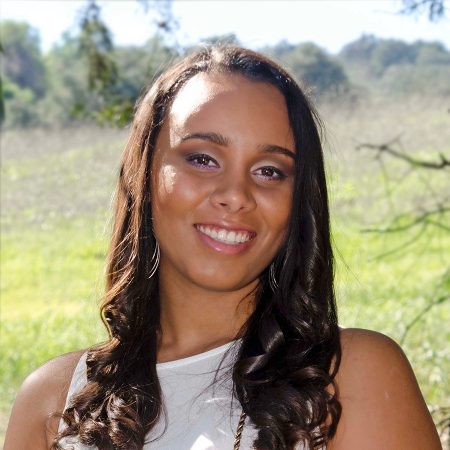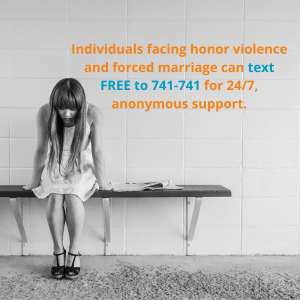AHA Helpline Manager Reports: “While Circumstances May Be Different, Emotions Remain the Same”

Sheriece Hooks has ran AHA's textline for the past two years. This month, she says goodbye.
The people who run AHA Foundation’s helpline are often unsung heroes in our fight against female genital mutilation (FGM), forced and marriage, and honor violence. As she leaves the organization, Sheriece Hooks reflects on her time working the helpline.
For two years, Sheriece Hooks answered hundreds of emails from girls and women seeking support, resources and somebody to understand their pain and fears as they struggled to break free from abuse. As she prepares to join the U.S. Navy’s psychotherapy team and finish her dissertation at Pepperdine University, we asked her to share with you about her experiences running AHA’s helpline.
Individuals facing honor violence and forced marriage can reach out to counselors at AHA’s Helpline at help@theahafoundation.org.
AHA Foundation: What have you learned during your time working on the helpline for AHA Foundation?
Sheriece: When I first began working for AHA Foundation, I had no knowledge about honor violence, nor did I know the difference between an arranged marriage and a forced marriage. My limited knowledge did not include that these issues also happen within the United States.
I think that my training and experience with AHA is significant in that it will help me to distinguish between similar issues in my clinical work, and will also allow me to learn and educate my peers about the trauma, so that the survivors may receive culturally appropriate and trauma-specific services.
 AHA Foundation: Were you surprised by the stories heard from survivors and at-risk women and girls?
AHA Foundation: Were you surprised by the stories heard from survivors and at-risk women and girls?
Sheriece: Although I felt prepared and expected the severity of many of the stories that I have heard from survivors and at-risk individuals, I was not prepared for the significant lack of resources. Unfortunately, we receive a lot of help requests from individuals in foreign countries, where the practices are extremely prevalent, and there is little support and resources available to help the women and girls.
It is easy to begin feeling helpless when the only options we can find for those in foreign countries are asylum, and the individual does not have the time or money to pursue the option.
AHA Foundation: Is there a common thread that connects some or many women who face these types of abuse and violence?
Sheriece: While the circumstances remain different, the emotions remain the same. People reach out to us describing feelings of profound sadness, being terrified, and feeling alone in their fight.
AHA Foundation: What would you tell the at-risk women out there that may be thinking about calling the helpline?
Sheriece: If you can find a safe space to reach out, we will give our best effort at trying to find a solution for you. Safety is our number one priority, and this organization was built for women and girls like you, who struggle with issues that society has largely unattended to.
“Safety is our number one priority, and this organization was built for women and girls like you, who struggle with issues that society has largely unattended to.”
If there are resources out there for you to accomplish your legal, physical, and mental health, or safety goals, our organization works to find them and facilitate a connection for you.
AHA Foundation: How have these calls changed during the lockdown from COVID-19?
Sheriece: Surprisingly, even though the number of requests for help received at our crisis text line continues to increase each month, the number of emails we have received during lockdown has significantly decreased. While I can only imagine reasons that this may be true, I feel that this likely suggests that people are not in safe environments to make calls or emails.
If people are forced to be in lockdown or quarantine with their perpetrators, it would be very difficult for them to reach out. Additionally, for those who have reached out, it has been extremely hard to connect them with resources because most places are shut down.
AHA Foundation: As well as calling the helpline, what else can women and girls suffering abuse do to help themselves?
Find trusted loved ones who can help support you throughout your journey. Support systems can make all of the difference between individuals who are able to safely escape, and those who feel stuck. If you are experiencing mental health issues and are feeling suicidal, call the suicide hotline (1-800-273-8255) to talk to someone about what you are experiencing.
AHA Foundation: What is your advice for new mental health professionals who will be soon working on the helpline?
Sheriece: My advice for them is to lean on one another to address the flood of emails we sometimes receive, to practice compassion, and to offer the best support you can for those who reach out, even if that means all that we can provide is emotional support.
Other Resources:
• Our ‘Know Your Rights’ Brochure
AHA Foundation: As you prepare to move to a new job, is there anything you’d like to share with AHA Foundation’s donors or people you’ve been helping through the helpline?
Sheriece: Thank you for your support, and please continue to provide what you can! While you may not get the opportunity to talk with the women we help, through our emails we see the endless gratitude from them.
These many thanks are extended to you, because without your funding, we would not be able to help.
“While you may not get the opportunity to talk with the women we help, through our emails we see the endless gratitude from them.”
AHA Foundation: Tell us about your future plans.
Sheriece: Following my work at AHA Foundation, I will be pursuing my psychology internship and finishing up my dissertation, which focuses on the counseling experiences of Black and African American individuals struggling with the effects of race-based stress and trauma. As a part of my internship, I have joined the United States Navy and will be providing psychotherapy services to active duty servicemen and servicewomen, and their families.
After leaving the Navy, I hope to continue my work as a trauma psychologist, and focus on decreasing mental health stigma, and providing culturally appropriate counseling services for underserved and marginalized communities.

